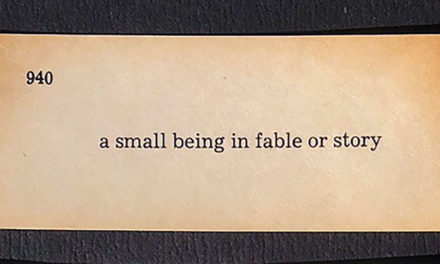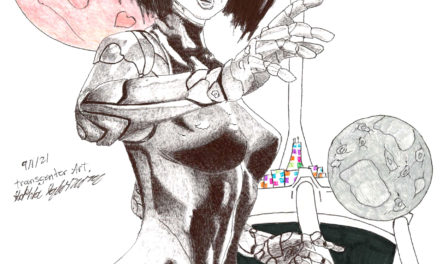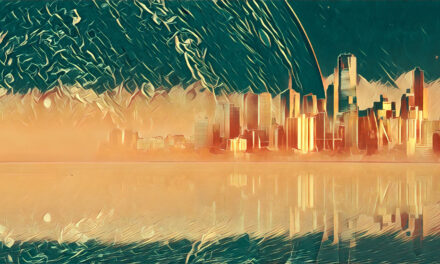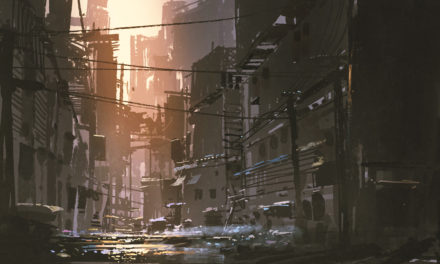Immortal Decision
by Erin Lale
Issue 1: Grotesque | 1300 words
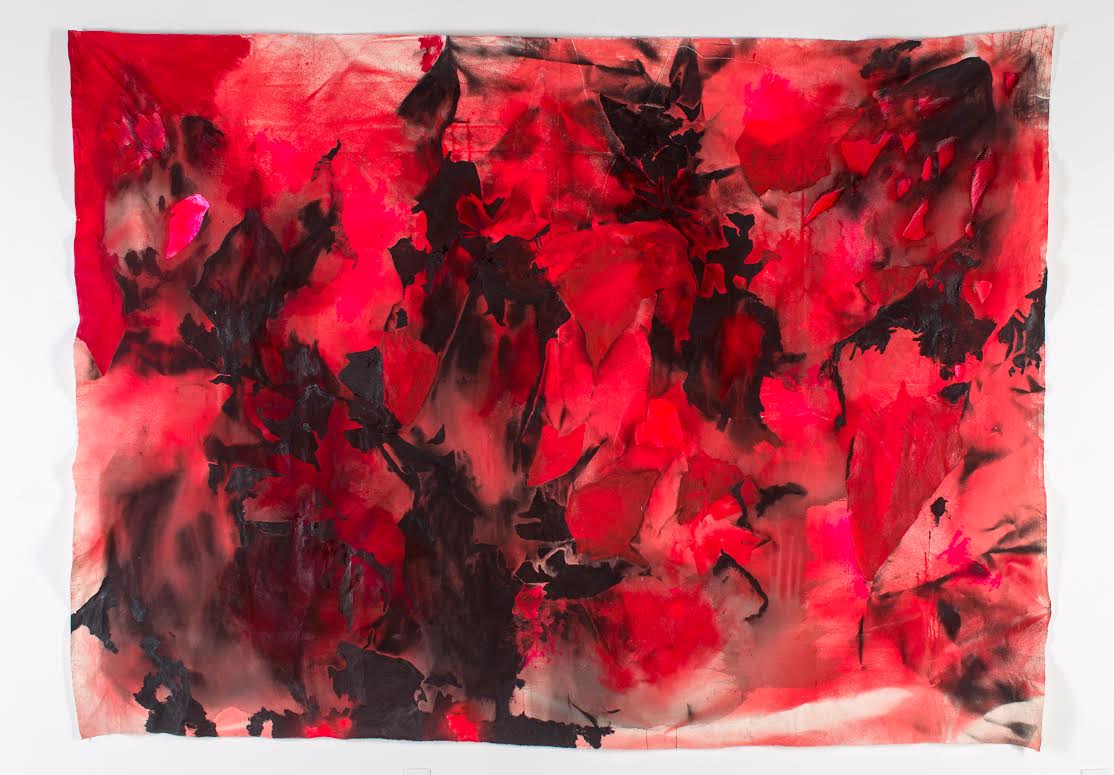
Big Red by Melanie Treuhaft
I dug through half-submerged wreckage of the old civilization, hydrogen-reactor-powered claws grasping, pulling, and discarding parts of the building. The remote control arm of my Snovus Mover felt like my own arm; I had been using one in that configuration for centuries and, of course, I had no real arm of my own with which to compare it. The Snovus Mover style I favored was a disk-shaped vehicle with small walking legs below, two big grabbing arms in the front, and swiveling eyestalks, much like a crab. It was the ultimate in-joke because only my generation still remembered when the first of us were created and the headlines screamed “Homo Cancerus!” Cancerus, which, of course, actually means crab. But we don’t use Latin anymore. Why name things in an extinct tongue of Homo sapiens? Everything is catalogued by a number now. That’s why we have no official name, beyond simply “people.”
Another crumbling block of concrete plopped into the dark water. I “heard” it via the sound sensors in my Mover and “felt” the rising temperature on the top of the Mover’s disk via the thermometers in the Mover’s shell. My real body was safe in a climate-controlled support cube hundreds of kilometers away.
My Mover got inside the first floor of the building and scuttled down a hallway still partially lit by ceiling fixtures. This confirmed that the light emission readings that had attracted me to this building were correct: this place was still running on its own power supply. That made this building highly unusual after all this time. This had been a medical facility once, according to the old city map stored in the Will. I poked into a few rooms, which held nothing more interesting than beds and antique medical equipment for use on the species we replaced. That must be why this building had not been looted yet. There might be nothing of real value up here. But that didn’t matter; it was the third sub-basement I was really interested in.
I crabbed down the stairs. The cryonics level was still lit up. Perhaps there would be some intact human corpses in here. There was nothing new to learn from them, scientifically, but there was great novelty value in their display. The elder humanity had displayed stuffed bears in their museums, and the bones of dinosaurs. We evolved from that culture, so it was not too surprising that we had a certain morbid curiosity for viewing the skulls of Neanderthals, like Homo sapiens did themselves, and for seeing the bodies that still set our own beauty standards, after all this time.
If I had had a head to shake, that thought would have merited a headshake. There were people who sculpted themselves into the form of the Homo sapiens, continually having parts cut off to maintain their shape. Most, however, did not, but then most people didn’t operate remote-controlled robots, either. I was the strange one, going outward and upward to old surface cities instead of inward to the virtual world of the Will.
On this lower floor, I continued to enter room after room and was disappointed to find most of the banks powered down and empty. After opening a door into a dark room, I turned on a light to explore, but I knew there was little chance of finding anything useful. As I had thought, the cryogenic freezer bank in here was full, but in bad condition, having suffered a power failure. I went on to the next room, and the next, all of which contained useless sludge. This entire wing must have suffered a power failure. I moved on to the next wing.
Ah, here were operating lights, at last. The computer terminal on the lab bench even appeared to be working. The bank’s indicator lights were lit up. My prize was within my grasp, but—the bank in here was divided wrong. The compartments were tiny. No full-sized human could fit in there.
At one of the lower compartments, I directed my left eyestalk to peer in. I saw nothing but a small container inside. I went to the lab bench and used my claws to climb onto the counter top and poke at the ancient computer. It woke up and showed me the last thing that had been on its screen. I used the translation features of the Will to read the page out loud. It was an inventory list for the bank of cryonics chambers in this room. Jackpot!
“26. Client Norma Herdez. Fertilized by sample 8950152A. 3rd week of development. Male.”
Oh.
Embryos. Those were embryos. I had come looking for corpses. I had found humans—alive. Or at least potentially alive.
If it were possible to revive them—and how would one do that without a womb in which to implant them? Well, that was a question science could answer, eventually, given enough time and resources—would it be ethical to bring a mortal being into a world where everyone else is immortal? But if these embryos—how many? 193, according to the old computer—if these embryos could be defrosted and grown to human adulthood, wouldn’t that mean they were alive right now? If that were so, they had already been brought into the world, and leaving them here would inevitably mean some future earthquake or flood, or just the eventual wearing out of the building’s generator, would kill them.
And—male, it said. 98 males and 95 females. Only. Nothing in between. Reviving these beings would reintroduce gender and all its complications. Not just politics, not just language, but a potentially self-replicating population. This would not just mean bringing a few humans to life temporarily, to be curiosities or perhaps celebrities, media sensations, here and gone in the space of a hundred years, but the creation of a permanent minority sentient species. The very one we replaced. Would it be fair to bring them to life, to live like that?
But would it be fair to deny them what they could do, in their brief lives? Oh, to live like a hero out of an old story, running, dancing, playing ball? Not stuck in a support cube as a pile of bubbles; to return to a genetic structure in which bone is a useful skeleton that holds them up when they walk? Specialized organs, even eyes. To look at something with real eyes of flesh, to walk beneath the sky and look up at the stars. To smell a rose, to pet a cat—did either of those things exist anymore? Even to fight. To rut. To create more of one’s kind, but a being different from oneself, not a scion cut from the undifferentiated mass. Would it be worth it to live only a hundred years, or even less, risking accident and disease and murder, to really live?
I have to admit that there is a longing inside me to do such things. We are not a totally separate kind of being from the elder humanity, really, not aliens whose ancestors never walked with feet. Every cell of our bodies remembers having skin, tasting food, making art with our hands. Our cells have merely forgotten when to die.
I hesitated with my claw over the old computer’s keyboard. Do I even have the right to make this decision? I came here for old dead things to display, museum style. Finders keepers, these were not things.
Who should make the decision then, if not me? A government committee? All the people, by debating and voting? A team of experts? What kind of experts—scientists, ethicists, priests? Reality show producers?
I directed the Will to encrypt the files of my last hour of movement. There was no need to make this decision now, while all the questions boiled within me. I could make my find public, or not. I could come back here secretly to revive them, or to kill them. I have all the time I need to make my decision. After all, I am immortal. I am Homo cancerus. The crab.
I climbed off the lab bench and scuttled away.

Erin Lale
Erin Lale is the author of Planet of the Magi and other books. She owned The Science Fiction Store in Las Vegas, published Berserkrgangr Magazine, was acquisitions editor at Eternal Press, and reviews books for Eternal Haunted Summer Magazine.

